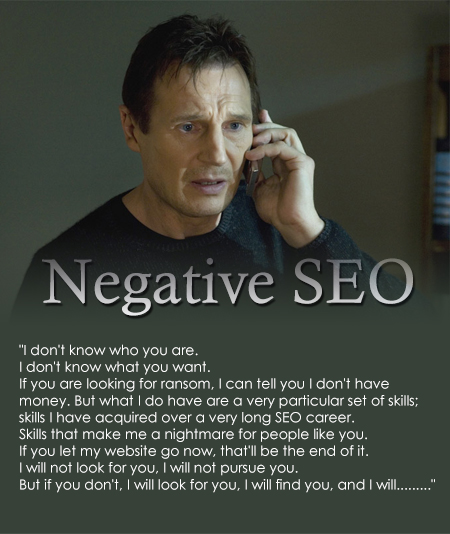What is SEO? Okay, so that’s quite an ambiguous question, but many businesses still treat Search Engine Optimization like it’s some kind of mythical Shangri-La, so it’s well worth touching on.
In its simplest form SEO is a series of activities undertaken to increase a site’s search engine visibility and performance, but it’s also so much more than that. Perhaps that’s why there are still a lot of small businesses out there who are unsure of where to start when it comes to SEO.
However, just because you’re not doing something, that doesn’t make you immune to it. Sometimes site owners will use a type of SEO designed not to improve their own search engine rankings but to harm those of a competing websites. Negative SEO can have serious ramifications on sites that aren’t prepared for it or those who are unable to identify and rectify it should it happen.
What is Negative SEO?
To sum it up in one sentence, Negative SEO is any malicious activity undertaken in an effort to lower a website’s search engine rankings. Sites have been known to use this technique on their competition in order to rank higher for certain keywords.
Although there’s been a lot of talk about negative SEO and its subsequent effects lately, it’s worth noting that negative SEO is not actually a new process. People have been employing suspect tactics across the web for as long as there’s been a web to use them on.
That being said, it’s not as rampant a risk as many expect, and it can be an incredibly costly (in both time and money) process to undertake. In many aspects, when people believe they have been “hit by negative SEO” it’s highly likely that they are just suffering from something they have failed to notice or change on their own site.
Google’s algorithms are constantly changing; which means that more often than not what people suspect to be the effects of “negative SEO” are actually caused by old links which have lost their value or old, stale content on their site holding them back against their competitors.
It’s still important to remember that some people do still carry out negative SEO though. Knowing what you should be looking out for will allow you to identify the signs early and deal with the problem accordingly.
What to look out for
Google’s algorithms analyse and inspect every website they come across, looking at what’s happening both on-site and off, and which sites are linking back and forth. Those sites with suspicious link profiles are at risk of seeing their search engine rankings drop.
One common negative SEO tactic is to purchase a large quantity of unnatural, spammy backlinks for a site. This kind of link behaviour is highly frowned upon by search engines, as it gives the impression that you’re trying to manipulate your own site’s PageRank.
Another tactic is the scraping of content. Copying and pasting one site’s content onto a number of other sites across the web can cause serious duplicate content issues. Search engines will flag that your content is not unique, and unless the original source of the content is abundantly clear, it will have a damaging effect on your site.
What can you do about it?
Whilst it may seem like there is little you can do to properly protect your site from negative SEO, you’re not completely defenceless.
For example, if a competitor really wants to carry out negative SEO against your site then it takes a lot of dedication and investment on their part for it to actually have a serious effect. If you stay vigilant you can recognise the warning signs of it happening and work to resolve the issue as quickly as possible.
To begin with, make sure you regularly check Google Analytics for any anomalies. Create custom alerts for when you have any sharp increases or decreases in traffic, and for when you see any extreme increases in your sites bounce rate.
You should also regularly perform an in-depth audit of your inbound links. You should regularly check your link profile to ensure that that they’re relevant to your site and that they use suitable anchor text.
Use backlink analysis tools like Majestic SEO to identify any anomalies in your link profile. Whilst most of the backlinks you’ll receive will probably be perfectly natural, if you do notice any strange activity you can work to remove or disavow the links, through the Google Disavow Tool.
Also, check your anchor text ratio. If you spot a large number of links with exact match anchor text, then it’s well worth looking into, as search engines tend to find this kind of behaviour suspicious. Try to ensure that no more than 10-20% of your anchor text is made up of exact-match keywords and that at least 50% is branded.
People spend a lot of time creating high-quality content, so it can be disheartening to find your content copied across the web. You can use tools like Copyscape to check if your content has been plagiarised by other websites.
While you can’t directly protect yourself from the effects of Negative SEO, it’s well worth knowing what to look out for. With basic knowledge of the above you’ll be able to monitor your site and work quickly to remedy the situation should any issues arise.
Ben Norman is a leading UK SEO Expert with an extensive knowledge of search engine marketing. He regularly writes straightforward search related posts for his SEO blog.
Image Credit: www.mckremie.com





